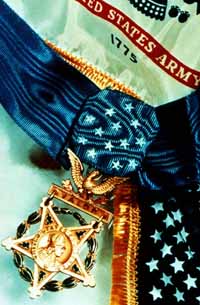|
Congressional Medal of Honor Highest award for military service personnel First awarded 1861
The Badge of Military Merit, as it was called, fell into oblivion until 1932, when General Douglas MacArthur, then Army Chief of Staff, pressed for its revival. Officially reinstituted on February 22, 1932, the now familiar Purple Heart was at first an Army award, given to those who had been wounded in World War I or who possessed a Meritorious Service Citation Certificate. In 1943, the order was amended to include personnel of the Navy, Marine Corps, and Coast Guard. Coverage was eventually extended to include all services and "any civilian national" wounded while serving with the Armed Forces. Although the Badge of Military Merit fell into disuse after the Revolutionary War, the idea of a decoration for individual gallantry remained through the early 1800s. In 1847, after the outbreak of the Mexican-American War, a "certificate of merit" was established for any soldier who distinguished himself in action. No medal went with the honor. After the Mexican-American War, the award was discontinued, which meant there was no military award with which to recognize the nation's fighting men. Early in the Civil War, a medal for individual valor was proposed to General-in-Chief of the Army Winfield Scott. But Scott felt medals smacked of European affectation and killed the idea. The medal found support in the Navy, however, where it was felt recognition of courage in strife was needed. Public Resolution 82, containing a provision for a Navy medal of valor, was signed into law by President Abraham Lincoln on December 21, 1861. The medal was "to be bestowed upon such petty officers, seamen, landsmen, and Marines as shall most distinguish themselves by their gallantry and other seamanlike qualities during the present war." Shortly after this, a resolution similar in wording was introduced on behalf of the Army. Signed into law July 12, 1862, the measure provided for awarding a medal of honor "to such noncommissioned officers and privates as shall most distinguish themselves by their gallantry in action, and other soldierlike qualities, during the present insurrection." Although it was created for the Civil War, Congress made the Medal of Honor a permanent decoration in 1863. Almost 3,400 men and one woman have received the award for heroic actions in the nation's battles since that time.
See also History of CMOH |
All rights reserved. For details and contact information: See License Agreement, Copyright Notice. |
 The first formal system for rewarding acts of individual gallantry by the nation's fighting men was established by General George Washington on August 7, 1782. Designed to recognize "any singularly meritorious action," the award consisted of a purple cloth heart. Records show that only three persons received the ward: Sergeant Elijah Churchill, Sergeant William Brown, and Sergeant Daniel Bissel Jr.
The first formal system for rewarding acts of individual gallantry by the nation's fighting men was established by General George Washington on August 7, 1782. Designed to recognize "any singularly meritorious action," the award consisted of a purple cloth heart. Records show that only three persons received the ward: Sergeant Elijah Churchill, Sergeant William Brown, and Sergeant Daniel Bissel Jr.